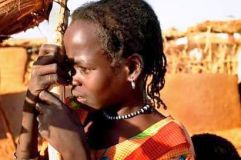US draft on UN Sudan mission skirts trials issue
By Irwin Arieff
UNITED NATIONS, Feb 14 (Reuters) – The United States on Monday circulated a draft U.N. resolution that would send as many as 10,000 peacekeepers to southern Sudan but dodges the question of where to try perpetrators of atrocities in Darfur.

|
|
A girl rests against a flimsy shack at Abushouk camp near El Fasher, the capital of North Darfur state, October 31, 2004. (Reuters). |
The draft Security Council resolution would also impose sanctions including a travel ban and a freeze on assets on those responsible for violating a cease-fire in Darfur, a region in Western Sudan where civil war has killed at least 70,000 people and driven 2 million from their homes.
The resolution, which U.S. officials said they hoped to bring to a vote within two weeks, is intended to help implement a peace agreement reached at the end of last year in a separate conflict in southern Sudan.
But the draft, distributed on Monday to Security Council members, stresses the need to build on the agreement in the south to achieve peace in Darfur as well, emphasizing that “there can be no military solution to the conflict in Darfur.”
The text would create a Security Council committee to identify which individuals should be subject to the sanctions.
It also would widen an arms embargo already in force in Darfur. While the existing embargo applies only to nongovernmental units including rebel groups and the Arab militia known as Janjaweed, the draft would ban arms sales to Sudan’s government as well.
However, the U.S. draft is silent on where those responsible for alleged war crimes and crimes against humanity in Darfur should be tried.
A U.N.-appointed commission reported two weeks ago that Sudan’s government and its militia allies had committed serious crimes under international law, setting the stage for Sudanese, militia and rebel leaders to be tried as war criminals.
The commission said Sudan’s judiciary could not handle such a task and recommended the perpetrators be tried by the International Criminal Court based in The Hague.
U.N. Secretary-General Kofi Annan has said the Security Council should refer the case of Sudan to the ICC, and nine of the council’s 15 member-nations belong to that court.
But the George W. Bush administration strongly opposes the ICC, fearing it could be used to prosecute U.S. soldiers and other officials serving abroad.
As an alternative, it has floated the idea of setting up a new U.N.-African Union tribunal in Tanzania, an idea that so far has won little support in the council.
The Khartoum government, for its part, has declared its opposition to any outside court, saying it wanted to handle any charges of serious crimes on its own.
The draft text expresses only the council’s determination that perpetrators of the crimes identified by the U.N. commission “be brought to justice through internationally accepted means.”
